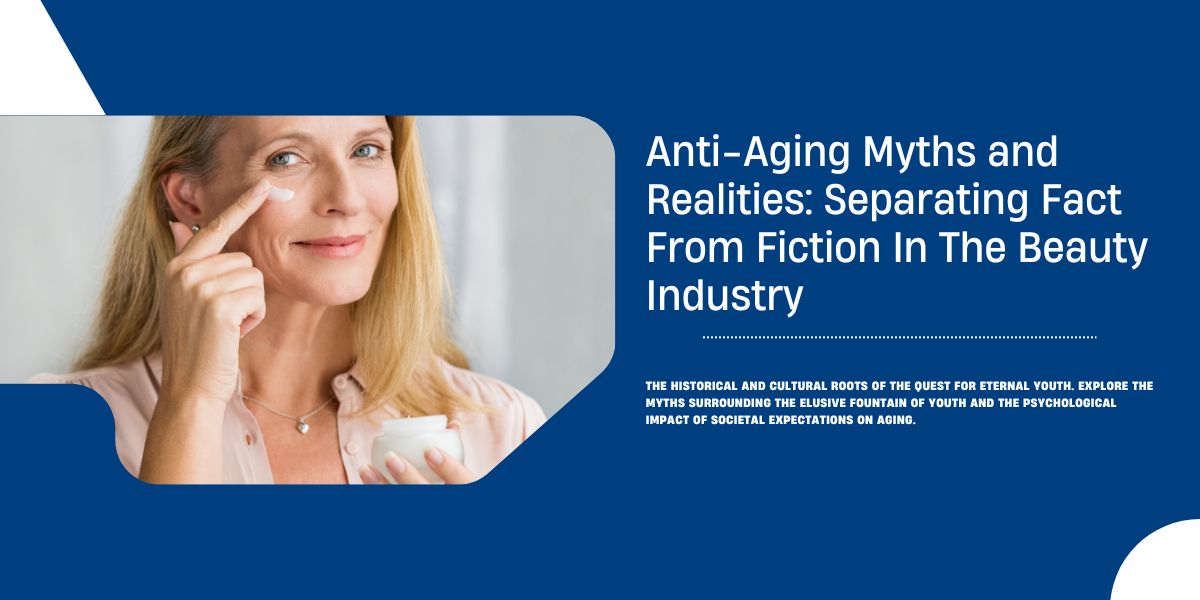Anti-Aging Myths and Realities: Separating Fact From Fiction In The Beauty Industry
Navigating the Maze: Debunking Anti-Aging Myths and Embracing Realities for Timeless Beauty

Anti-aging myths and realities: Separating fact from fiction in the beauty industry
The beauty industry is full of products and promises that claim to reverse or prevent the signs of aging. But how much of what we hear is true, and how much is just marketing hype? In this blog post, we will explore some of the common myths and realities about anti-aging, and provide you with some evidence-based tips to keep your skin healthy and youthful.
1: Smiling and frowning cause wrinkles
Reality: Wrinkles are mainly caused by the loss of collagen and elastin, two proteins that give your skin its structure and elasticity. As you age, your body produces less of these proteins, making your skin thinner and less resilient. Sun exposure, smoking, pollution, and other environmental factors can also damage your skin and accelerate the aging process. Smiling and frowning do not cause permanent wrinkles, but they may make them more visible if your skin is dry or dehydrated. To prevent this, keep your skin moisturized with a hydrating lotion or cream, and drink plenty of water.
2: You can rely on homemade packs for anti-aging
Reality: While natural ingredients may have some benefits for your skin, they are not enough to combat the effects of aging. Homemade packs may provide temporary hydration or exfoliation, but they cannot penetrate deep into your skin or stimulate collagen production. For more effective results, you need to use products that contain active ingredients such as retinol, peptides, antioxidants, or hyaluronic acid. These ingredients can help reduce the appearance of wrinkles, improve skin texture, and protect your skin from free radical damage.
3: You inherit your wrinkles from your mom
Reality: Genetics play a role in how your skin ages, but they are not the only factor. Your lifestyle choices, such as diet, exercise, stress management, and sleep quality, have a significant impact on your skin health and appearance. For example, studies have shown that chronic stress can increase inflammation and oxidative stress in your body, which can lead to premature aging. On the other hand, regular exercise can improve blood circulation and oxygen delivery to your skin cells, which can enhance their function and repair. Therefore, you can influence how your skin ages by adopting healthy habits and avoiding harmful ones.
4: Sunscreen has nothing to do with anti-aging
Reality: Sunscreen is one of the most important products for anti-aging, as it protects your skin from the harmful effects of ultraviolet (UV) rays. UV rays can cause sunburns, DNA damage, pigmentation, and skin cancer. They can also break down collagen and elastin in your skin, leading to sagging and wrinkling. To prevent this, you should wear sunscreen every day, even on cloudy or rainy days. Choose a sunscreen that has at least SPF 30 and broad-spectrum protection against both UVA and UVB rays. Reapply it every two hours or more often if you sweat or swim.
5: Anti-aging products work only at night
Reality: Anti-aging products work both day and night, but they may have different functions depending on the time of day. Day creams usually contain SPF and antioxidants, which help shield your skin from sun damage and environmental stressors. Night creams usually contain retinol and peptides, which help stimulate collagen production and repair your skin while you sleep. Both types of creams are beneficial for anti-aging, but you need to use them consistently and correctly to see results.
6: Anti-aging products are only for older people
Reality: Anti-aging products are not only for older people, but for anyone who wants to prevent or delay the signs of aging. Aging is a gradual process that starts in your 20s, when your collagen production begins to decline. By using anti-aging products early on, you can help slow down this process and maintain your skin’s youthful appearance. However, you should also choose products that are suitable for your skin type and age group. For example, younger people may benefit from lighter formulas that hydrate and protect their skin without clogging their pores. Older people may need richer formulas that nourish and firm their skin without irritating it.




